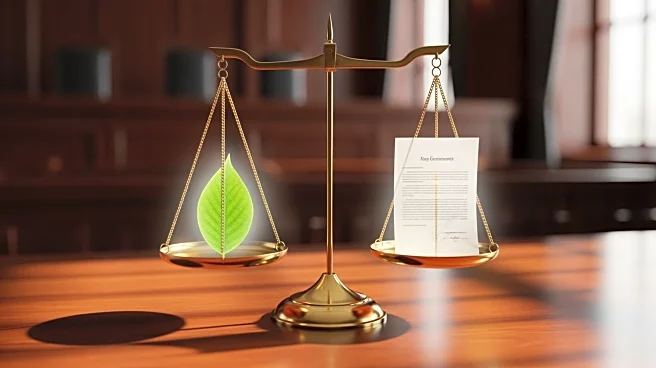What's Happening?
The Ninth Circuit Court has temporarily halted the enforcement of California's SB 261, a law requiring companies with annual revenues over $500 million to disclose climate-related financial risks. This
decision comes after the U.S. Chamber of Commerce and other business groups challenged the law, arguing it violates the First Amendment. The court's injunction allows companies to delay compliance with SB 261 until a ruling is made on the appeal. Meanwhile, the California Air Resources Board (CARB) is adjusting its approach to defining 'doing business in California' and 'revenue' for compliance purposes, using corporate tax filings for more accurate data. CARB continues to refine its guidelines and welcomes public comments to inform future rulemaking.
Why It's Important?
The Ninth Circuit's decision to pause SB 261 enforcement is significant as it impacts how businesses report climate-related risks, potentially affecting corporate transparency and accountability in environmental matters. This legal challenge underscores the tension between regulatory efforts to address climate change and business interests concerned about compliance costs and constitutional rights. The outcome of this appeal could set a precedent for similar laws nationwide, influencing how states regulate corporate environmental disclosures. Companies may benefit from reduced immediate compliance burdens, but the delay could hinder efforts to mitigate climate risks through informed business practices.
What's Next?
Oral arguments for the appeal are scheduled for January 2026, after the initial SB 261 reports are due. CARB is expected to issue further guidance in response to the court's decision, potentially adjusting deadlines and compliance requirements. Stakeholders, including businesses and environmental groups, will likely continue to engage in the public comment process to shape the final regulations. The legal proceedings could prompt other states to reconsider or reinforce their climate disclosure laws, depending on the Ninth Circuit's final ruling.
Beyond the Headlines
The legal challenge to SB 261 highlights broader issues of corporate governance and environmental responsibility. As businesses navigate these regulations, they may face ethical considerations regarding their role in addressing climate change. The case also raises questions about the balance between state regulatory power and corporate rights, potentially influencing future legislative efforts in environmental policy. Long-term, the development of robust climate disclosure frameworks could drive innovation in sustainable business practices and enhance investor confidence in environmentally responsible companies.










